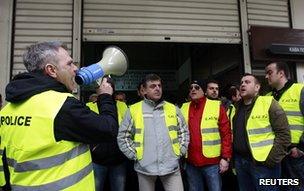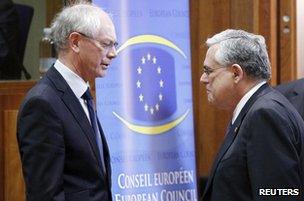Europe and the threat weapon
- Published
- comments

Greek police protest against their pension fund's involvement in the debt swap
This week, world markets have been edgy.
All eyes, once again, are on Greece and whether private investors will finally agree to accept big losses on their holdings of Greek debt.
The deadline is Thursday evening. The losses are intended to shave off a chunk from the Greek debt mountain. This is a key element in the second Greek bailout package.
For only if the private investors come on board will the bailout be implemented with Greece receiving new funding. Without it, the country will face bankruptcy later in March when large payments are due.
So it is potentially another crisis moment for the eurozone.
It has become a feature of this drama that as key votes and decisions approach, so the threat level soars.
As the moment of decision arrived for banks and hedge funds, it was no surprise yesterday that European officials were busy handing out a report prepared by the Institute of International Finance, external, the body negotiating on behalf of some of the investors.
The document, external is apocalyptic in tone.
If Greece defaults, it argues, then it is hard to see how the damaging ramifications would not exceed one trillion euros
There would be a collapse of the Greek banking system
Contagion would spread to Portugal and "might then quickly spread to Ireland, Italy and Spain"
The European Central Bank would incur huge losses
"Greece's effective expulsion from the EU," the document goes on, "would represent the first failure of European integration since the founding of the coal and steel community in 1951. This would have lasting ramifications"
All of these dire warnings may be true but again they may not be. There are eminent economists who believe it would be better for Greece to exit the euro - albeit in an orderly way. Some prominent German economists believe the risk of contagion is over-stated.
There is a pattern here. When facing a challenge or an important vote or a difficult summit European officials and leaders unfailingly ratchet up the risk.
It happened the other day when Dutch politician Geert Wilders floated the idea of the Netherlands returning to the guilder.
The President of the European Council Herman Van Rompuy replied: "if one left the euro, the Netherlands would not be the only country, and the eurozone would fall apart. The whole union would fall apart."

This is another potential crisis moment for the eurozone
Such an outcome is possible but would the whole union fall apart?
Again, when the Irish agreed to hold a referendum on the new pact to ensure greater budget responsibility in the eurozone the government said - almost immediately - it would be a vote on whether to stay in or leave the euro.
Perhaps - or would it be a vote on whether Ireland wanted key decisions on its budget taken in Brussels?
Recently the Greek parliament was asked to vote on further austerity measures in order to qualify for a further bailout and avoid a default.
Greek Prime Minister Lucas Papademos said a 'No' vote - and the failure of a second rescue - "would create conditions of uncontrollable economic chaos and a social explosion".
Again the argument can be had. Certainly there would be difficult days for Greece if it defaulted. No question. But that is true if it accepts the conditions for staying in the euro.
As the economist, Paul Krugman, points out, external: even with the euro, countries face a bleak future. "Without the means to devalue," he wrote, "they [those countries] are in for a long period of mass unemployment and slow, grinding deflation."
Back in December, just before another critical summit, President Sarkozy said: "the euro lies at the heart of Europe. If it collapses Europe will not survive."
Again, possibly. But others point out that Europe operated effectively before the euro.
The French president and some of his ministers have said that if the euro failed, conflict could once again return to the continent. "If the euro is destroyed," President Sarkozy said, "it is the whole of Europe that goes up in smoke. If Europe goes up in smoke it's the peace of our continent that will be one day or another called into question." Debateable.
Recently, speaking in Germany the head of the IMF Christine Lagarde spoke of the dangers of a "moment ultimately leading to a downward spiral that could engulf the entire world".
In order to push through new measures, more scrutiny, more Europe, closer integration, the language of catastrophe and disaster has been frequently deployed.
In truth most of the risks are unknowable and the warnings and threats are all open to argument.